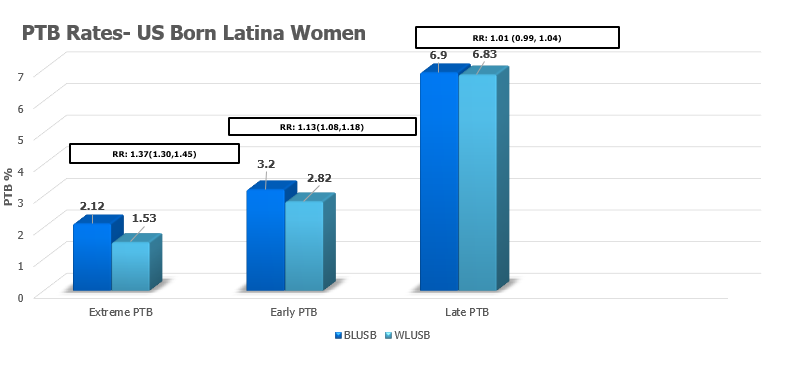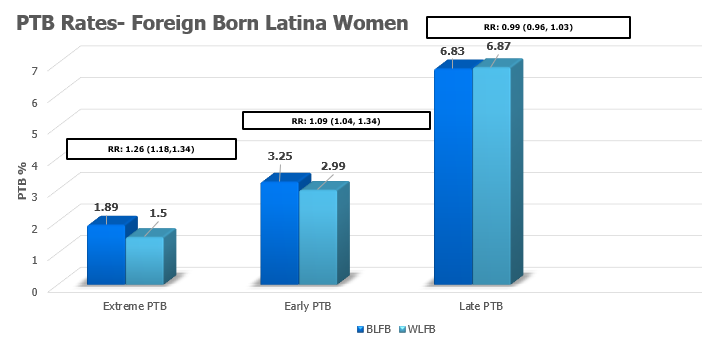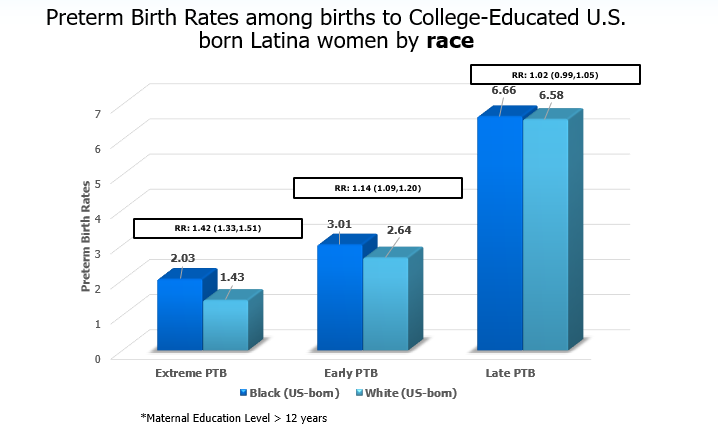Neonatology
Session: Neo-Perinatal Health Care Delivery 3: Epidemiology/Health Services Research
265 - Preterm birth rates among US-born and foreign-born Latina women in the United States: the effect of Black Race
Sunday, May 5, 2024
3:30 PM - 6:00 PM ET
Poster Number: 265
Publication Number: 265.2140
Publication Number: 265.2140

Blair A. Simon, MD
Fellow
Ann & Robert H. Lurie Children's Hospital of Chicago
Chicago, Illinois, United States
Presenting Author(s)
Background: The Latinx population is the second largest and fastest growing ethnic group in the U.S., accounting for almost 19% of the total US population. Notably, a significant percentage of Latina women self-identify as Black. Race represents a major social determinant of adverse birth outcome among non-Latina women. Interestingly, the terms race and ethnicity are often used interchangeably in literature. This concept warrants further exploration into the nuances that differ between race and ethnicity, and their interplay with neonatal outcomes. Currently there is a paucity of research that explores the contribution of race to preterm birth (PTB) rates among Latina women.
Objective: To determine the extent to which Black race is a risk factor for PTB among US-born and foreign-born Latina women in the U.S.
Design/Methods: Stratified and multivariable binominal log-linear regression analyses were performed on the 2018-2020 vital records obtained from the National Center for Health Statistics. The study was limited to the singleton live-births to Latina women who self-identified as Black or White.
Results: The extremely ( < 32 weeks) and moderately (32-34 weeks ) early PTB rates of US-born Latina Black women (N=958,249) exceeded those of US-born White women; in contrast, late (34-36.6 week) PTB rates did not vary by maternal race (Figure 1). A similar pattern occurred among foreign-born women (Figure 2). In both nativity cohorts, a racial disparity in extremely and moderately early PTB rates existed among of college-educated US-born Latina women (Figure 3). In log-binomial regression models, the adjusted (controlling for maternal age, education, marital status, region of residence, prenatal care usage, and previous live births) RR of extremely early, moderately early, and late PTB among US-born Black (compared to White) Latina women equaled 1.26 (1.18, 1.34), 1.09 (1.04, 1.14), and 0.99 (0.96, 1.03), respectively. The adjusted RR of extremely early, moderately early, and late PTB among foreign-born Black (compared to White) Latina women equaled 1.25 (1.18, 1.34), 1.08 (1.03, 1.14), and 0.99 (0.96, 1.02), respectively.
Conclusion(s): Self-identified black race is a risk factor for extremely early and moderately early PTB among US-born and foreign-born Latina women. These intriguing findings highlight that the contextual consequences of Black race on birth outcome extends to Latina women.



